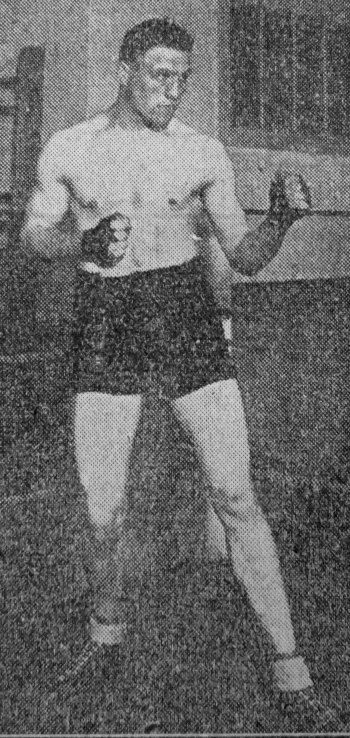Mexborough and Swinton Times December 28, 1928
Harry Crossley,
The Mexboro’ Cruiserweight.

Since Harry Crossley began his boxing career in July 1924 he has fought 45 bouts and has not yet been knocked out, He has won 20 of those bouts by knock-outs.
His first fights were with Cyril Devine and George Slack (Highfields), both of whom he beat at Mexborough. Mr. W. Bridgewater, notoriously quick to spot promise early, then took him over and since then Crossley’s story is one of rapid development into very near the top class. In 1924 he made just over 11 stone, now he is about 12-10, but he can still make the cruiser weight, 12-7.
Mr. Bridgewater has kept Harry pretty busy, and but for an attack of influenza, followed by one of pleurisy a year or so ago, he would probably stand even closer to the threshold of the championship class than he does at the moment. After Mr. Bridgewater became his manager he started by beating Charlie Cunningham, a Bentley boxer of some promise, at Mexborough, and George Slack, the Highfields lad, at Doncaster.
His first defeat was by Nick Hennessy (Liverpool), at Manchester. His first knock-out victim was Billie Marsden (Leeds), whom he beat in that fashion at Sheffield. He followed that with another knockout, of McArnold (Goole), at Goole. Farmer Jackson, the Adwick man, held him to a draw at Mexboro’, and boxing substitute he lost on points to Jim Macdonald at Leeds.
Then he opened a long run of successes. It began with the beating of George Williams (Felling) – a heavyweight—in five rounds. He went on to beat Percy Stobbart (Rotherham), at Doncaster, and to knock out Billy Cook (Woolwich), in the Blackfriars Ring in nine rounds. The sequence continued with the knock-out of Harry Moody, of Hull, in ten rounds at Scunthorpe, and knock-outs of Ike Clarke, of Birkenhead, at Liverpool (five rounds), and Jim Slater, of Walsall, at Leicester (five rounds).
He next appeared at Southampton, in a bill which included Phil Scott and Heeney, and put up a good light but lost on points to Dick Power, then heavyweight champion of Wales. Just before the 1926 coal dispute he won another light: with George Slack, at Leeds. During the dispute he knocked out Rocky Knight, the coloured boxer, and Eugene Steppe, the big Belgian, both at Leeds. In his second bout with George Slack, this time at Sunder land, he won again decisively—by a knock-out in the eleventh round.
His next series of fights was prelude to a long list of knock-outs. He beat Jim Hankinson (Northwich) at Manchester, Charlie Chetwynd (Leicester) at Nottingham. Then came title following knock-outs;
Jack Phoenix (Dublin), at Leeds: 15th round.
Marine Trinder (Portsmouth), at Mexboro’: 3rd.
Tom Fowler (London), at Sbeffield: 4th;
P.O. Stubbs, at Mexboro’: 4th.
Charlie Chetwynd, at Leeds: 10th.
Joe Mullins (Catford), at Mexboro’: 4th.;
Seaman Chaplin. (Grimsby), at Scunthorpe: 2nd.;He
Stoker Miller (an R.N. champion), Scunthorpe: 3rd.
Interspersed with these were a second win over Rocky Knight, at Nuneaton, and a win over another Belgian, Gene Leroi, at Grimsby. It was then that the attack of influenza occurred and Crossley was not, as a result, at his fittest, when he lost the bout with Clough, the powerful Accrington boxer, at Manchester.
After that Crossley was out of action for some months with pleurisy but on his return to the ring he showed he had made a complete recovery by making a satisfactory debut at the National Sporting Club and beating Jim Shaw on points. That minor bout brought him prominently to the notice of headquarters and since then Crossley has been listed all over the country as one of the dangerous coming men of the day.
His next appearance shortly afterwards, was in that gruelling battle with Con O’Kelly at Hull,—which many of us still think Crossley won, but which was declared a draw. The next two bouts in this country were both won and both were fought at Sheffield: with Martnouget, the Frenchman, and Harry Foster, who was knocked out in the second round.
Following that Crossley made his first visit to Germany and at once established himself in the favour of the boxing fans of that country. Dr. Haymann, Germany’s leading man at the weight, was awarded a disputed verdict over Crossley. The next fight, at Doncaster, ended in the knock-out of Eddie Riches, the Londoner, in five rounds.
And that brings us to the Shortland fight, the second and recent trip to Germany, and the great bout ten days ago with Stanley. In addition to the adverse points decision in the meeting with Shortland, and the more than creditable draw with Stanley, Crossley has within the last few months beaten another Frenchman, Louis Maurer, by a knock-out in the fourth round, at Leicester; and Harry Robinson, of Manchester, on points at Blackpool. His second German tour brought him another adverse verdict in the return match with Haymann, a draw with Wagner at Cologne and successes over Guhring and Muller, two other leading German boxers.